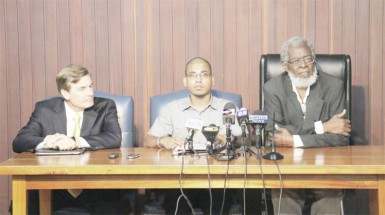Guyana and the United States yesterday announc-ed that they have agreed to temporarily put the contentious Leadership and Democracy (LEAD) Project on hold to facilitate talks between the two governments.
Head of the Presidential Secretariat Dr. Roger Luncheon and United States Ambassador Brent Hardt made the joint announcement at a press conference held at the Office of the President.
“The governments of Guyana and the United States of America have agreed that the implementation of the activities of the USAID LEAD project would be put on hold temporarily during the re-engagement on the design of that project, which the two sides have agreed would commence immediately,” the announcement stated.
“It is our sincere hope that the re-engagement we begin today can address all outstanding concerns related to the LEAD programme and allow us to chart a way forward in the spirit of the partnership that has traditionally characterised our bilateral relationship,” the US envoy said.
Hardt added that he remained optimistic that the talks will be completed by the end of his tenure here in July this year.
Luncheon told Stabroek News that while critics may claim that the government wants the $300M project to be stalled indefinitely, this was highly unlikely. “I would say this to you: It is not impossible but highly unlikely to happen,” he repeated three times, while stressing on “not impossible.”

He added that while a timeframe was not set out for the duration of the talks, ensuring that the project was beneficial to Guyanese is what is important. “We haven’t established a timeframe… but I don’t believe that one should be looking at those words idly nor should one be conceding that the activities between the governments of Guyana and the US would be dictated solely by considerations of time… the engagement is intended to benefit the people of Guyana and the decisions that flow… I can’t believe is one flippantly made and is constrained by time constraints only,” he further said.
The announcement yesterday followed months of bruising exchanges between the two sides. The government was adamant that the project not go ahead while the US was equally insistent that it would proceed notwithstanding the government’s objections.
Aspects of the project continued here despite the government’s objections. Matters came to a head last week when the government revoked the work permit of the head of the project, Glen Bradbury.
In an interview with the Government Information Agency (GINA) last week, President Donald Ramotar said that the LEAD project was not needed here. Ramotar and other government officials have alleged that Guyana was not consulted on it.
The US has strongly denied this. Government officials had also claimed that the project was making money available to political parties—a charge that the US had also strenuously denied.
Luncheon noted that he welcomed the opportunity to move on in a structured way and that he believed that there are considerable expectations about a mutually beneficial outcome. “What essentially we have had to deal with—and I am of the opinion has been resolved—is a process of re-engagement but not under duress,” he said. The government had previously been called for the halt of the project’s implementation as a precondition for continued engagement on it.
The US Ambassador stated that his government also welcomed the willingness of the government to re-engage and stressed that the programme was significantly beneficial to the Guyanese populace. He maintained that the programme was developed through extensive consultations with stakeholders, including the government.
“LEAD seeks to address concerns such as ongoing challenges in achieving consensus in parliament on key developmental issues such as the [Anti-Money Laundering and Countering the Financing of Terrorism] bill and hydropower development as well as the need for greater civic education in preparation for local government elections, which the government has publicly cited as a necessary precondition for such elections,” he said.
“The engagement of the Government of Guyana in the project is vital to its ultimate success, which is why we have seen seeking with diligence and persistence to work with the government to address any misunderstandings it may have about the programme and purposes,” he added.
Luncheon noted that he could not pointedly state what aspects of the project government objects to but that when the two sides sit down to talk those areas would be ironed out.
Asked about LEAD project head Glen Bradbury’s work permit revocation, he would only say “I would want to believe that the resolution would be part and parcel of our progress with our engagement… I am quite certain that that matter would be answered,” he added.
Hardt explained that the permit revocation has nothing to do with the project’s halt and that it was his government’s commitment to engage in talks established through bilateral relations that was the reason for the talks. He expressed confidence that a resolution would be had soon.
“I am confident that we can reach a resolution and I think my confidence in this is buoyed by the fact that many of the things that we are talking about and we will be talking about have previously been part of bilateral discussions between our governments on which we have been able to agree in the past,” he said.
“I believe the government of Guyana will agree today, as it did in 2009, that these are all good things for the people of Guyana and that they are also areas where USAID assistance can continue to play a positive and constructive role,” he added.




